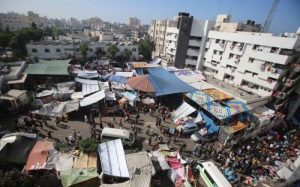 Gaza Strip: Hamas agreed to release 13 Israelis and seven foreigners late on Saturday in exchange for 39 Palestinians imprisoned by Israel, Qatari and Egyptian mediators said, after the militant group delayed the second round of swaps for several hours and claimed that Israel had violated the terms of a truce deal.
Gaza Strip: Hamas agreed to release 13 Israelis and seven foreigners late on Saturday in exchange for 39 Palestinians imprisoned by Israel, Qatari and Egyptian mediators said, after the militant group delayed the second round of swaps for several hours and claimed that Israel had violated the terms of a truce deal.
Close to midnight, Hamas said it had handed over all 20 to the International Committee for the Red Cross.
Overall, Hamas is to release at least 50 Israeli hostages, and Israel 150 Palestinian prisoners, during the four-day truce — all women and minors.
Israel has said the truce can be extended an extra day for every additional 10 hostages freed — something US President Joe Biden said he hoped would occur.
Separately, a Qatari delegation arrived in Israel on Saturday to coordinate with parties on the ground and “ensure the deal continues to move smoothly”, according to a diplomat briefed on the visit. The diplomat spoke on condition of anonymity because he was not authorised to discuss details with the media.
The start of the pause brought quiet for 2.3 million Palestinians reeling from relentless Israeli bombardment that has killed thousands, driven three-quarters of the population from their homes and levelled residential areas. Rocket fire from Gaza militants into Israel also went silent.
War-weary Palestinians in northern Gaza returned to the streets, crunching over rubble between shattered buildings and at times digging through it with bare hands. At the Indonesian hospital in Jabaliya, besieged by the Israeli military earlier this month, bodies lay in the courtyard and outside the main gate.
For Emad Abu Hajer, a resident of the Jabaliya refugee camp in the Gaza City area, the pause meant he could again search through the remains of his home, which was flattened in an Israeli attack last week.
He found the bodies of a cousin and nephew, bringing the death toll in the attack to 19. His sister and two other relatives are still missing.
We want to find them and bury them in dignity,” he said.
The United Nations said the pause enabled it to scale up the delivery of food, water, and medicine to the largest volume since the resumption of aid convoys on October 21. It was also able to deliver 129,000 litres of fuel — just over 10 per cent of the daily pre-war volume — as well as cooking gas, a first since the war began.
In the southern city of Khan Younis, a long line of people with containers waited outside a filling station. Hossam Fayad lamented that the pause in fighting was only for four days.
“I wish it could be extended until people’s conditions improved,” he said.
For the first time in over a month, aid reached northern Gaza. The Palestinian Red Crescent said 61 trucks carrying food, water and medical supplies headed there on Saturday, the largest aid convoy to reach the area yet. The UN said it and the Palestinian Red Crescent were also able to evacuate 40 patients and family members from a hospital in Gaza City to a hospital in Khan Younis.
